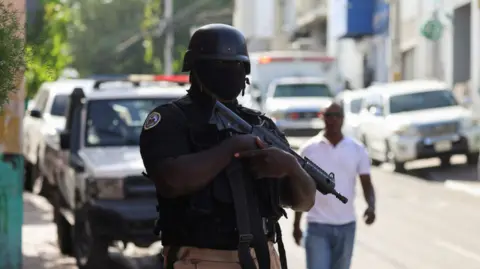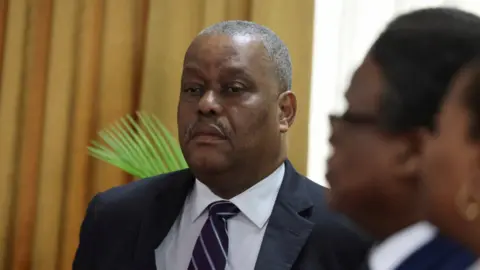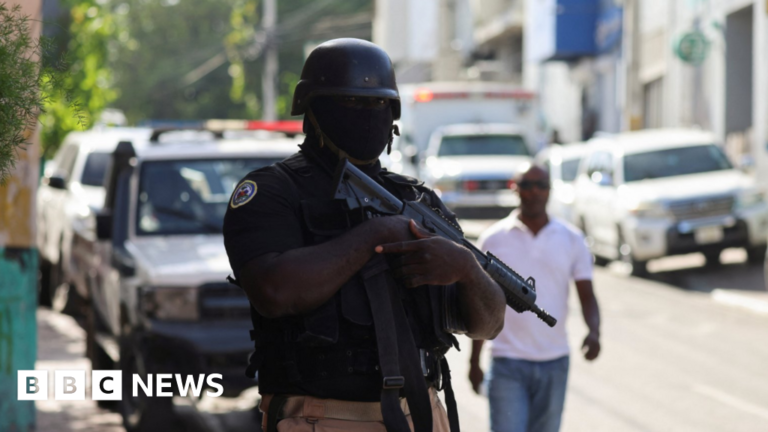By Will he grant, Correspondent Mexico and Central America • George Wright, BBC News
 Reuters
ReutersA new government has been formed in Haiti as it attempts to restore order in the violence-wracked country.
The new cabinet completely replaces all ministers in the government of former Prime Minister Ariel Henry, who was forced to resign earlier this year by gangs that control large parts of Haiti.
The announcement of the composition of the new cabinet comes two weeks after the country’s transitional government council appointed Garry Conille as interim prime minister.
He will also assume the functions of Minister of the Interior, according to the decree published in Official Journal of Haiti.
The formation of a cabinet in Haiti is a further sign of efforts to bring some political stability to a nation ravaged by violence and uncertainty for many months.
The transition council has appointed people to all key cabinet positions as well as their ministers, a spokeswoman confirmed.
 Reuters
ReutersMr. Conille’s lawyer, Carlos Hercules, will be minister of justice and public security and Haiti’s ambassador to UNESCO, Dominique Dupuy, will be minister of Foreign Affairs.
Princeton graduate Ketleen Florestal succeeds Michel Patrick Boisvert, who also served as interim prime minister this year, at the Finance Ministry.
Even if some Haitians will be encouraged by these first steps towards normality, especially after the recent reopening of the country’s international airportothers remain deeply concerned by the scale of the task facing the new government.
Gangs still control most of the capital, Port-au-Prince, and gang leaders refuse to recognize the legitimacy of the interim council or transitional leaders.
Last year, a UN-backed security force led by Kenya was promised to bolster Haiti’s embattled police, but it has yet to be deployed.
The planned deployment of around 1,000 Kenyan police officers to try to restore order has not yet materialized, although Kenyan President William Ruto reiterated his support for the plan in a BBC interview. last month.
Mr Henry agreed to resign in March after armed groups blocked his return to the country from Kenya, where he had gone for talks with President Ruto.
The gangs took advantage of the power vacuum left by the prime minister’s departure and extended their control over swaths of the country, which effectively became lawless in places.
The situation in Haiti was described as “cataclysmic” by the United Nations in a report released last month.
It said more than 1,500 people were killed and 800 injured in the first three months of 2024.
The report details the “atrocious practices” of the gangs, accused of using extreme violence and sexual abuse as a means of punishment and control.
Aid groups have reported difficulties getting food and water to the capital, warning that millions of people are unable to find enough to eat – with some on the brink of starvation.
Haiti’s problems worsened after the presidential assassination of Jovenel Moïse in 2021, which plunged the nation into upheaval. The gangs have expanded their control over the country while displacing thousands of civilians.
The country has not had a president since the assassination and it has no sitting parliament.
Haiti: the basics
- This Caribbean country shares a border with the Dominican Republic and has an estimated population of 11.5 million.
- Its area is 27,800 km², which is slightly smaller than Belgium and about the same size as the US state of Maryland.
- Chronic instability, dictatorships and natural disasters in recent decades have made Haiti the poorest country in the Americas.
- An earthquake in 2010 killed more than 200,000 people and caused significant damage to infrastructure and the economy.
- A UN peacekeeping force was established in 2004 to help stabilize the country and only withdrew in 2017.
- In July 2021, President Jovenel Moïse was assassinated by unidentified armed men in Port-au-Prince. In a political impasse, the country continues to be ravaged by unrest and gang violence.



